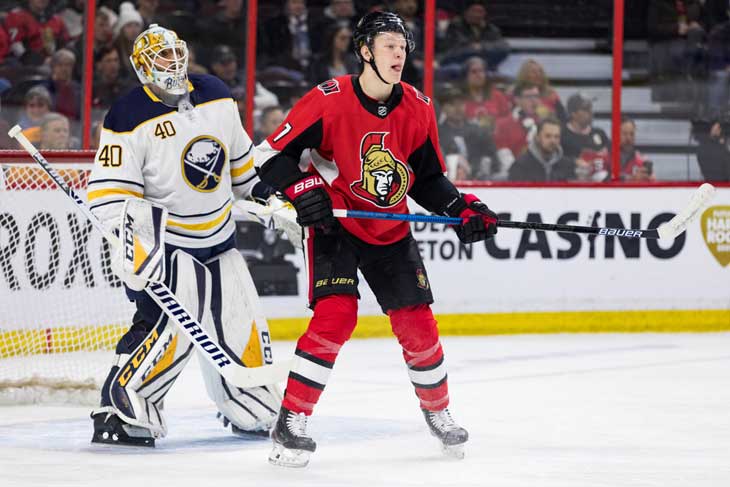2018-19 Season Review: Ottawa Senators
There were no bombshells or historic worst-to-first rallies for the Ottawa Senators last season. They floundered at the bottom of the barrel for good reason: They weren’t any good.
Heading into the year, the Sens were a dysfunctional 28-win club that had just traded two of its top three scorers away. A bizarre personal situation led Ottawa’s management to ship sharpshooter Mike Hoffman to San Jose before he was immediately flipped to Florida. Meanwhile, captain Erik Karlsson’s contractual impasse resulted in a blockbuster deal to San Jose. The team’s roster wasn’t particularly strong to begin with. After those moves, it was bare. Beyond phenomenal two-way winger Mark Stone, Matt Duchene had struggled in his first year with the Sens, Bobby Ryan hadn’t recovered from his downward spiral, the defense was in shambles and the pieces acquired from the trades didn’t seem poised to replace their predecessors.
Given how far they were from a complete team, they chose to lean heavily in one particular direction: offense. That was uncharacteristic of a squad coached by Guy Boucher. Then again, his defense had collapsed to the tune of 3.46 goals against per game the previous year, so perhaps he was willing to ride out the storm until reinforcements arrived.
The biggest beneficiary of this entertaining, fundamentally terrible hockey was pending unrestricted free agent Duchene (58 points in 50 games). This was a glorious opportunity to raise his market value in a low-pressure environment, and he capitalized by exceeding the point-per-game mark for the first time in his career. Without needing to worry as much about his defensive responsibilities, the 28-year-old turned his attention strictly to producing offense. He flourished on the rush and did very well to create space for himself down low with his edge work and elusiveness. Though the eye test has always been kinder to Duchene than his raw numbers, he still managed to reach a new plateau at the most convenient time.
Fellow UFA Ryan Dzingel (44 points in 57 games) was tailor-made for this freewheeling style too. He’s quite frankly a coach’s nightmare: an inconsistent speed merchant who floats when he isn’t directly involved in the action yet produces just enough to justify his place in the lineup. It’s not like the Sens had better pieces waiting in the wings anyway. The stars aligned for the 27-year-old to enjoy a breakout season, as Ottawa loosened the reins and abandoned its structure right as he was set to test free agency’s waters.
Chris Tierney (48 points in 81 games), who was part of the package Ottawa obtained for Karlsson, came screaming out of the gates with 11 points in 11 games. That pace didn’t hold up over the entire year, of course, but the 25-year-old topped his previous single-season mark by eight points. Rookies Brady Tkachuk (45 points in 71 games) and Colin White (41 points in 71 games) also performed very well in this setting. Tkachuk’s sturdy build (6’3”, 196 lbs) and nose for the net were evident from the moment he stepped onto NHL ice, whereas White provided a versatile offensive skill set following a decent year in the AHL. Getting that kind of early production from first-round picks is certainly promising.
On the back end, Thomas Chabot (55 points in 70 games) was eager to replace Karlsson’s electrifying contributions. The 22-year-old showed incredible confidence and dynamism with the puck, dashing up the ice and challenging opponents when most blueliners wouldn’t dare. There were shifts when it seemed as though he was on a different playing field, lugging the puck from end to end or skating circles around the opposition without breaking a sweat. By the end of December, he was ranked third in defensive scoring with 38 points in 38 games. While Chabot did eventually run out of steam, he offered game-changing offense from the blue line and cause for excitement within the organization.
But there was one major problem: These inflated stats came at the expense of winning games.
Ultimately, the Sens were indeed as awful as the standings indicated. At 5-on-5, they controlled 44.9% of the shot attempts (31st), 46.0% of the scoring chances (30th) and 47.5% of the high-danger bids (22nd) for a 46.7% expected goal share (27th). Ottawa put all of its eggs in the offensive basket, enjoyed the seventh-highest on-ice shooting percentage in the league and…still ranked just 17th in goals per game. Meanwhile, the team finished dead last on defense due to total three-zone indifference from the forwards and porous net-front coverage from the rearguards.
Shaky veteran netminder Craig Anderson (3.51 GAA, 90.3 SV%) and his backups combined for the third-worst on-ice save percentage (90.7), which only exacerbated the team’s overall issues. Ottawa conceded the fourth-most high-danger chances and the most high-danger goals in the NHL.
The only Sen who bothered to show up and play winning hockey was Stone (62 points in 59 games). He consistently hounded the puck and tilted the ice toward the opposition’s zone, where he could then flash his combination of crafty playmaking and uncanny persistence. During his shifts, Ottawa posted a 52.2 CF%, 56.3 SCF% and 57.7 HDCF% for a 57.2 xGF%. The two other forwards above the 50.0 xGF% threshold were his linemates Tkachuk and White. Yeah, Stone is really, really good. Since he was a pending UFA as well, a massive payday loomed on the horizon. The budget-conscious Sens sprung to action once more, trading him to Vegas at the deadline for blue line prospect Erik Brannstrom, Oscar Lindberg and a second-rounder.
Since Duchene and Dzingel were also swapped to Columbus, Ottawa was flirting with disaster: There was a distinct possibility that the team ponied up for a season-and-a-half of Duchene’s services only to finish last and watch the Avalanche pick a franchise-altering talent at first overall. Luckily, the draft lottery pushed that selection down to fourth overall and Ottawa’s management could breathe a sigh of relief.
However, the outlook for 2019-20 isn’t exactly rosy either.
The Sens hired former Toronto Maple Leafs assistant coach D.J. Smith as their new bench boss. One could easily argue that coaching has held Toronto back over the past three years, so it remains to be seen whether Smith can implement the right system for his squad.
Roster-wise, Cody Ceci and Ben Harpur were traded to the Leafs for Nikita Zaitsev and Connor Brown (29 points in 82 games). In a strange turn, fellow Leafs Ron Hainsey and Tyler Ennis (18 points in 51 games) also signed with Ottawa. Declining vet Zack Smith (28 points in 70 games) was dealt to Chicago for an equally frustrating forward in 31-year-old Artem Anisimov (37 points in 78 games). The Sens probably have a slight edge in value across these moves, but it’s marginal. Despite greater upside than Smith, Anisimov is no longer taking the ice alongside Patrick Kane. Brown is a decent utility player and Ennis should offer a nice dose of offense from the bottom six. Along the blue line, Zaitsev and Hainsey facing the Atlantic Division’s top guns is…frightening.
If there’s any significant progress, it will come internally. Brannstrom is a terrific prospect who would bring an instant puck-moving upgrade to the defense. That would be crucial considering Hainsey, Zaitsev and Mark Borowiecki’s shortcomings in that department. If he isn’t ready yet, Christian Wolanin (12 points in 30 games) and Maxime Lajoie (15 points in 56 games) are other youngsters who will compete for a spot on the left side.
Up front, Tkachuk and White will look to dispel any notions that they were carried by Stone. Drake Batherson is ready to cement a full-time role after a wonderful year in the AHL (62 points in 59 games) and decent performances in the NHL (9 points in 20 games). The 21-year-old is quick, smart and among the top Sens in pure offensive skill. Ottawa also re-signed Anthony Duclair (14 points in 21 games), who produced very well after a midseason trade. With that said, those points came in garbage time. He hasn’t shown the ability to play sound hockey thus far and Smith will face the tall order of maintaining Duclair’s scoring prowess without compromising the team’s solidity. The tools are there. He simply needs the right coach to push the right buttons.
Elsewhere, there’s a ton of uncertainty.
Josh Norris, Logan Brown (0 points in 2 games), Filip Chlapik (1 point in 5 games), Alex Formenton (1 point in 9 games) and Nick Paul (2 points in 20 games) are pieces who could push for pro spots, but they could just as easily require another year of seasoning. Rudolfs Balcers (14 points in 36 games), Max Veronneau (4 points in 12 games), Jack Rodewald (0 points in 6 games) and Vitaly Abramov (0 points in 1 game) are fringe players who could see some minutes too.
On the whole, however, Ottawa still lacks high-end forward talent, its defense is questionable and the goaltending is subpar at best. Smith will have to work his tail off to lift this team above the sum of its parts.
Recent Posts

How Corey Perry Is Making His Presence Felt With the Lightning
View Post »
How Adam Fox Pushed the Rangers Past the Penguins
View Post »

 PHI
PHI PIT
PIT TOR
TOR MTL
MTL TBL
TBL CHI
CHI EDM
EDM VAN
VAN COL
COL STL
STL BUF
BUF WSH
WSH NJD
NJD BOS
BOS NYR
NYR NYI
NYI DET
DET CAR
CAR NSH
NSH CBJ
CBJ WPJ
WPJ CGY
CGY ARI
ARI SJS
SJS VGK
VGK ANA
ANA LAK
LAK MIN
MIN OTT
OTT FLO
FLO DAL
DAL